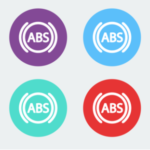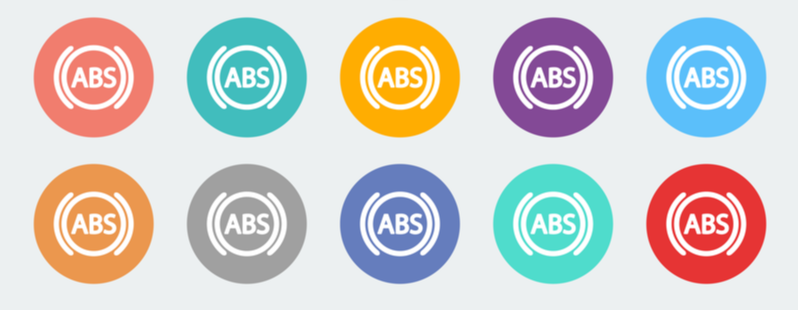 Most of us rarely think about the anti-lock brakes in our cars. They are just sort of existing in the background, keeping us safe. It can take a lit ABS warning light in our dash before we know an issue is brewing. A service technician can tell if the ABS Controller is damaged or if there are sensor problems. For your safety, schedule a brake repair service whenever you experience changes in the feel or application of your brakes.
Most of us rarely think about the anti-lock brakes in our cars. They are just sort of existing in the background, keeping us safe. It can take a lit ABS warning light in our dash before we know an issue is brewing. A service technician can tell if the ABS Controller is damaged or if there are sensor problems. For your safety, schedule a brake repair service whenever you experience changes in the feel or application of your brakes.
What Are Anti-Lock Brakes (ABS)
Most cars manufactured today come equipped with anti-lock brakes. Their design allows the driver to brake quickly without the risk of losing control of their vehicle due to wheel lock-up. Anti-lock brakes are safer and can provide more effective stopping than traditional non-ABS brakes.
How ABS Brakes Work
The ABS brake system works through a network of sensors that relay braking information to the computer system. The computer then controls the hydraulic brake valves to quickly activate and release the brakes, causing the automobile to come to a controlled stop. It is important to remember, never pump the brake pedal if your car comes equipped with an ABS braking system. Manually pumping the brakes can hinder the ABS and increase your vehicle’s stopping distance. Anti-lock brakes work more effectively when the vehicle’s tires are in good condition and have the correct air pressure.
Common Brake Concerns
Brake issues can happen slowly or suddenly, taking you by surprise. While this is not a complete list of brake concerns, look out for these common signs:
- Illuminated ABS Warning Light
- Brakes lock up erratically
- The brake pedal is unresponsive
- The brake pedal requires more effort
- Speedometer malfunctions
Common ABS: Anti-lock Brakes Issues
Performing routine maintenance on your entire braking system is essential. Many auto manufacturers recommend having a brake inspection service every 5,000 – 7,000 miles or 4 – 6 months. Read your owner’s manual or consult your service technician to determine how often you should schedule a brake service. When you see the ABS warning light in your dash, here are some common issues that can be causing it.
ABS Controller or ABS Control Module
The ABS Controller is a computer microprocessor. It runs diagnostic checks on the vehicle’s ABS system and controls the ABS Modulator. Have your service technician replace the ABS controller if it goes bad or becomes damaged.
ABS Modulator or Hydraulic Control Unit (HCU)
The ABS Modulator is usually located in the engine compartment of your vehicle. It transfers electronic signals from the ABS Controller to regulate the brake fluid pressure via a solenoid. The number of solenoids used in the ABS modulator can vary. An ABS modulator can fail through normal wear & tear, leaking fluids, and corrosion.
ABS Wheel Speed Sensor Problems
The ABS Wheel Speed Sensor gauges the wheel’s rotating speed and sends the information to the ABS Controller. When the ABS wheel speed sensor perceives the vehicle is losing traction, it signals the ABS controller to pump the brake several times per second. Sensor problems occur when they get dirty from road grime or brake dust. If there is an issue with the ABS wheel speed sensor, you may experience a loss of traction while driving.
Low Brake Fluid
In addition to issues with the ABS components, low brake fluid can also be one of the reasons for the ABS warning light. It is also one of the easiest items to check yourself. If the brake fluid reservoir is low, top it off with brake fluid. Make sure you use the type recommended for your car. However, if you’re frequently adding brake fluid, there may be a fluid leak in the brake system. In this case, you should definitely bring your vehicle in for service.
Dirty or Burnt Brake Fluid
If it has been more than two years or 30,000 miles since your last brake flush, consider getting one to improve brake performance. Brake fluid accumulates dirt, moisture, and debris from everyday driving. Driving in hilly terrain or ‘riding the brakes’ is considered Severe Driving Conditions and may require more frequent service.
Brake Bleeding
If your brake pedal feels squishy, you may have air in the brake lines. When a service technician bleeds the brakes, they don’t replace the brake fluid. They remove just enough fluid to purge air bubbles from the brake line.
Anti-lock Brakes Repair in Kirkland, WA
Welcome to Fisher’s Auto Service. We are the brake repair experts in Kirkland, WA. Our highly trained technicians use state-of-the-art equipment to diagnose and repair anti-lock brake systems in all domestic and import vehicles.
Schedule ABS Brake Service
If you’d like to make an appointment for an ABS Brake Service, please call (425) 441-3601 or use our online appointment maker.

